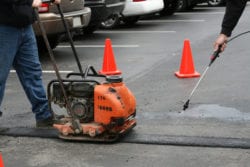Understanding Common Types Of Cracks That Call For Asphalt Driveway Repair
Even a properly installed driveway is not immune to damage forever. At some point, you may begin to see cracks on the surfaces that tend to worsen with each day they go without repairs. Precipitation and temperature changes make the water inside the crevices expand and contract, widening the gaps on the surface. We recommend seeking timely asphalt driveway repair to prevent small issues from developing into major problems.
Potholes are the most common types of cracks. These are cavities that often occur when the substrate foundation of a driveway is compromised. This is the layer that features recycled concrete and crushed rocks, and it helps to give the surface a solid base. Proper installation services can go a long way in reducing the risk of potholes. With a strong under-layer, small cracks are less likely to grow into huge potholes.
Linear cracks also referred to as longitudinal cracks, run parallel towards the center of a surface. They form when the pavement contracts because of cold temperature. Again, these types of cracks is less likely to occur if you seek top-notch installation services. If your pavements have linear cracks, we can repair them by resealing the surface.
Alligator cracks are also quite common. They form when a pavement lacks proper drainage and water keeps standing on the surfaces. Alligator cracks resemble reptilian skin, and they can cover large areas if a pavement was poorly installed. Often repairing these cracks involves inspecting the base and possibly changing the material underneath. The idea is to enhance the substrate strength of the foundation and creating better angling to improve drainage.
Block cracks form when the temperature drops, causing shrinkage of asphalt. These square cracks connect to each other loosely and can go as deep as half an inch. We recommend seeking timely repairs because block cracks that are less than half an inch deep can be repaired by resealing. Anything deeper may be more expensive to fix, and we may have to remove the old surface and install a patch.







